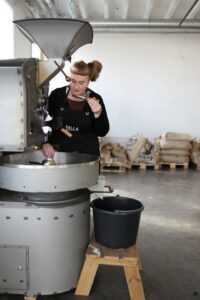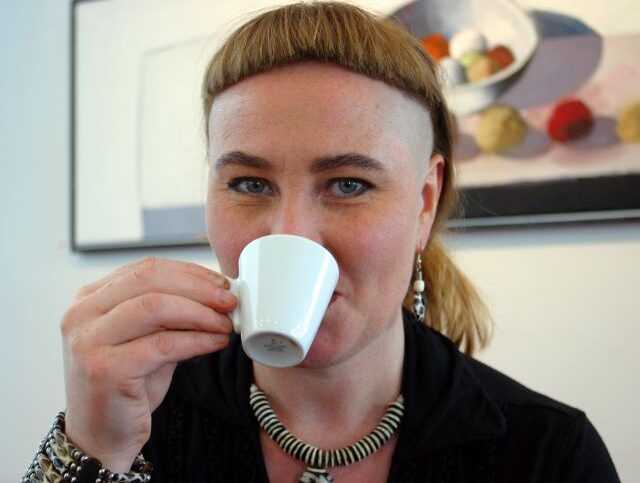MILAN – From Iceland comes a breath of fresh air with an interview to Sonja Björk Grant, a true guru in the sector, from competitions – which she has attended as a judge, setting up the entire competition system – to her tireless work as a barista, roaster and trainer. In short, she does not lack experience in the field, and we had the pleasure of recounting her specialty world.
Sonja Björk Grant runs her own business called Kaffibrugghúsið, a multi-functional coffee company: what does it mean exactly?
“The idea behind Kaffibrugghúsið is to be a wholesale/retail micro roastery, a knowledge center with seminars and training for anybody interested from coffee professionals to coffeelovers. We get many groups of people for cupping to experience difference flavor profiles and pushing the taste buds bounderies.
Kaffibrugghúsið was also originally going to be a coffeeshop with cooked breakfast. But during Covid 19 the format changed and the coffeeshop never opened. And now the idea of having our own coffeeshop is not our priorities. We are rethinking the original idea and what kind of a format/service we would like to offer. It could be a pop up café with limited opening hours, who knows.”
As a professional and trainer of judges, you have influenced the development of the competition’s judging system: could you tell us in which way?
“I would probably say that I was at the right time with inspiring people when there was need for the barista scene to change. I was lucky to be involved with the World Coffee Championships since before 2000 when the first WBC was held. Then in being involved the first years of changes/developments within European and American Specialty Coffee Organizations and then automatically with the first years of World Coffee Event that since 2011 oversee all 7 World Coffee Championships.
And the path was to be a part of everything, from organizing the championships, participating in various committees developing rules and regulations for various championships. Calibrating and training judges in a national/International level was my biggest interest and being on the team that created judges training systems was really fun and challenging. Judges for championships have to go through a lot of training and calibration that never ends. Training programs like WCEP ( World Championship Educational Program) have been very helpful for judges on a national level.

Looking back I feel extremely lucky to have met all these amazing coffee professionals over the years and to have a chance to help out pushing the boundaries of barista professionalism with the goal of “think global, act local”. It sounds so easy when I’m saying these words but of course it was only possible with dedicated people that were willing to volunterly dedicate their free time and passion to help developing our industry.”
How important are the competitions to develop the barista figure in all over the world?
“My opinion is that the Championships have been a very important chapter to push professionalism forward. Worldwide. It’s not only that barista profession has more respect from consumers but also that the baristas respect their own profession in a healthier way. And the whole manufactory industry has developed a lot with help of dedicated baristas that are seeking for opportunities to have an impact. The Championships used to be the only measurement of success for the barista profession but nowadays there are more educational tools to use to push the bounderies of the barista profession. I would still think that the journey of training hard for a championship in a national/world level is the best longterm practice with an overall professional result.”
You have coached several champions in different countries, but have you ever thought of going to the other side of the podium?
Sonja Björk Grant laughes: “I have been competing in Horseback riding, running 800m, Icehockey, Handball, Football and some other sports in the past. I only competed once in a national barista championship (the year 2000) and I was no good. So the simple answer is: no.”
Sonja Björk Grant also tells us about his work in The Coffee Roasters Guild

“To begin with, I was contacted by SCAE and asked to help out starting a Roasters Guild of Europe. I was really happy and honoured to have a chance to develop an organization for roasters. I gathered great professional diverse roasters from different countries in Europe and by June 2015 we had met with a framework for an interesting organization with focus on education, science, networking and transparency among other inspiring ideas. We put
together committees and created Roasters Camp. The role model was Retreat of Roasters Guild of America. The first Camp of Roasters Guild of Europe was in 2016 and it was a great success: instantly it became a great independent event, creative, inspiring and fun event.
In 2017/2018 European and American Roasters Guild joined forces and became one organization, The Coffee Roasters Guild. The European version kept its independent character and the same for the American one. My last involvement was early 2021 when I was the outgoing chairwoman of the CRG board and represented CRG on the SCA board. From the unification of the organisations the goal of being more global has been
actively aimed for and although I’m not involve anymore I can see that the original goals are still being honored and pushed forward.”
How do you drink and roast coffee in Iceland?
“In Iceland we drink a lot of filter coffee, batch brew. The first espresso machine arrived to Iceland 1958 but it was not until after the championships (the year 2000) started that barista profession begun to be more respected in Iceland. And Icelandic people are still drinking a lot of milk beverages, but I feel like the espresso culture is growing. There are 11 Icelandic roasteries and all of them are importing high quality arabicas. Three/four of the roasteries are biggest, having their beans in the supermarkets and running their own coffeeshops. The other roasteries are considered micro roasters, like my company, Kaffibrugghúsið. The smaller roasteries are roasting their coffee lighter than the bigger companies. But I would say that overall the roasteries in Iceland are roasting light to medium. It’s a typical Scandinavian roasts profiles.”
Sonja Björk Grant, what’s the specialty scene like there? Is the third wave still explosive or are we talking about later steps?
“The Specialty Coffee scene is quite simple in Iceland. It’s a market of 350.000 people and the first third wave roastery was started by me 2008, Kaffismidja Íslands ( I sold that company 2013 and they changed their name to Reykjavík Roasters and it has 3-4 locations) The bigger roasteries have their own coffeeshops from 4-14 locations. Those coffeeshops serve handbrewed coffees, batch brew, coldbrews, tonics and espresso based drinks with minimum food menus. Since it is a small market, there are not many dramatic explosions for innovations.”
How do you think the sector will evolve? What are the future trends?
Sonja Björk Grant: “I think we are still in the sector of second/third wave and I do not see many big changes or innovating trends stepping in soon. But I do believe it is fun not to know everything and then you can be surprised by some inspiring trends that accidently happen.”
And what can you tell us about your next professional and personal projects?
Sonja Björk Grant concludes: “It’s a big question! I do believe that Covid helped with re-thinking ideas, getting inspiration from life and it helped us moving the focus and being more creative and brave when it comes down to business. I have a co-owner, Njáll Björgvinsson and we have interesting tasks ahead of us to continue importing interesting green coffee. And being responsible for actions towards to nature, environment, social awareness and supporting the global coffee community. There are so many ideas to put into actions.
About my personal projects…coffee is kind of my hobby as well as a job, I love that the future is open and not fixed plan. I will most likely also continue to travel within Iceland or abroad to hike and exploring new adventures. You know… just to be present and enjoy life with a cup of coffee.”


















